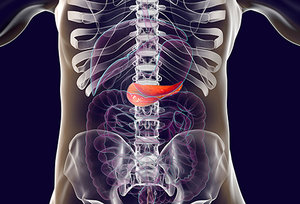Sugar Kills the Pancreas
By Editorial Staff
Your pancreas is an important organ of the body; among other functions, it produces enzymes that assist with the digestive process and hormones that help control blood sugar levels. The pancreas is also critical in the sense that if something goes wrong, such as cancer, the survival rate is among the lowest for all types of cancer. In other words, you want to keep your pancreas healthy and happy.
Drinking sugar-sweetened beverages is definitely not the way to do that, suggests research. In a 25-year study involving more than 500,000 adults (ages 20-60+ at the start of the study), researchers identified four categories of daily sugar-sweetened beverage (SSB) intake: a 1/2 serving or less; at least a 1/2 serving, but not a full serving; at least one serving, but not two; and two servings or more. (One serving was defined as 12 ounces and containing 35 grams of added sugar.)
People who reported consuming two servings of SSBs a day were 50 percent more likely to die from pancreatic cancer during the 25-year study period. Not surprisingly, younger adults (age 40 or younger) reported drinking more sugar-sweetened beverages than older adults – and were also the most likely to die of pancreatic cancer: three times the risk if drinking two or more servings a day compared to those drinking less. In fact, the increased risk for the younger age group started with just one daily serving of sugar-sweetened beverages.
 What about the possibility that other risk factors for pancreatic cancer could have been present? The study authors actually accounted for some of these: smoking, diabetes, obesity, and hypertension. The increased risk associated with drinking sugar-sweetened beverages remained. Study findings appear in the research journal Frontiers in Oncology.
What about the possibility that other risk factors for pancreatic cancer could have been present? The study authors actually accounted for some of these: smoking, diabetes, obesity, and hypertension. The increased risk associated with drinking sugar-sweetened beverages remained. Study findings appear in the research journal Frontiers in Oncology.
Take-home points: 1) Sugar-sweetened beverage consumption is bad for your pancreas. (Remember, we're talking about added sugar; natural sugars present in 100% orange or apple juice, etc., don't count, although research suggests for overall health, those should be limited as well). 2) Younger adults (age 40 or younger) are at the highest risk; in their study, researchers identified that often, the younger group's "habitual SSB consumption typically started during their teenage years, making its weaning extremely difficult." 3) At any age, you should limit your daily sugar-sweetened beverage intake per the guidelines used in the study (fewer than 12 ounces / 35 grams of added sugar) – none at all is even better.
And finally, since SSB consumption often starts early, teach your children – and lead by example – that when it comes to your pancreas (not to mention the rest of your body), added sugars in drinks and foods are bad, bad news.
Page printed from:
http://www.toyourhealth.com/mpacms/tyh/article.php?id=3032&no_paginate=true&no_b=true
|

